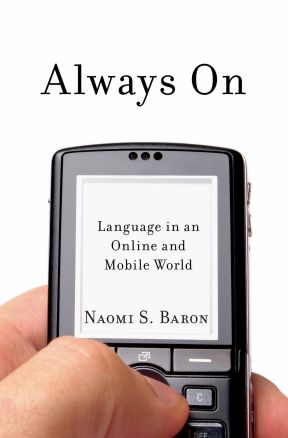Naomi S. Baron, author of Always On: Language in an Online and Mobile World, is Professor of Linguistics at American University in Washington, DC. Always On explores the linguistic and social impact of computers and mobile phones. A former Guggenheim and Fulbright fellow, she is also the author of Alphabet to Email: How Written English Evolvedand Where It’s Heading, which probes the influence of technology on English over the past 1200 years. Baron is currently studying mobile phone use in cross-cultural context.
Admit it.
Sometimes you don’t want to talk with certain people. You spy a colleague down the hall, coming towards you. He’s a notorious chatterbox, so you duck down the nearest corridor. Your sister-in-law calls as you are settling in for an evening’s television, and you concoct excuses about preparing to leave the house.
Telecommunication devices help us maneuver when we converse with whom. Answering machines (reborn as voicemail) respond for us, even when we are sitting beside the phone, listening in. Speaker phones free us to multitask – and to subject unwitting callers to larger audiences than they bargained for. Skype lets us choose who gets to see us and who may only hear our voice.
Or  take instant messaging, which allows you to “block” people, leading them to believe you aren’t logged on to your IM client, when you actually are. One undergraduate I interviewed regularly blocked his mother whenever he wanted to post away messages containing raunchy language. After his friends had a day or so to take in his humor, he removed the message – and unblocked Mom.
take instant messaging, which allows you to “block” people, leading them to believe you aren’t logged on to your IM client, when you actually are. One undergraduate I interviewed regularly blocked his mother whenever he wanted to post away messages containing raunchy language. After his friends had a day or so to take in his humor, he removed the message – and unblocked Mom.
Social networking sites add more control options. Studies of Facebook have observed how young people in America stage themselves through photographs, quotations, and relationship status – aptly illustrating Erving Goffman’s notion of “presentation of self in everyday life.” One student at my university described her page on Facebook as “more an expression of who one wants to be than who one really is. [It’s] me on my best day.” Like a puppeteer pulling the strings, she manipulates what her friends see (and presumably think) of her.
Both IM and social networking sites also redefine what it means to keep in touch with friends. College students frequently read friends’ away messages on IM to catch up on their activities, rather than picking up the phone or launching an IM conversation. Facebook has been described as “a way of maintaining a friendship without having to make any effort whatsoever,” since you can see what your friends are up to simply by viewing their pages. In fact, Facebook will notify you when the birthdays of your online “Friends” roll around, so you can post a birthday greeting on their Facebook “Wall” (think of an electronic notice board). It’s Happy Birthday without risk of personal involvement.
What’s the problem? For starters, micro-managed human interaction undermines personal courage. (“You lacked the guts to tell her to her face you have a new girlfriend, but sent her a text message?”) It also devalues the other person’s right of response, replacing dialogue with monologue.
Recently I have been studying how university students in Sweden, the US, and Italy use their mobile phones. To understand why young people choose to send a text message (rather than make a voice call), I asked students to evaluate this possible explanation: “I want to make my message short, and talking takes too long.”
The cross-cultural data were amazingly consistent. Between 68% and 73% of subjects in all three countries judged this rationale to be either a “very important” or “somewhat important” reason to send a text message instead of calling. Participants in subsequent focus groups repeatedly stressed how expedient it was to get their message out without having to “waste” time with pleasantries or risk getting into actual conversations.
Like most technologies, computers and mobile phones are mixed blessings. Internal combustion engines brought the convenience of automobiles, but they also pollute the planet. Mobile phones are invaluable for bridging distance, yet they magnify our ability to distance ourselves from others.
Admittedly, children have long posted “Keep Out” signs on their tree-houses or bedroom doors.
But consider this: Today’s college students hear their mobile phone ring, glance at the number, and proceed to ignore the call because “It’s only Mom” – a story I heard many times in the US and even in family-friendly Italy.
“Only Mom.” As communal beings, part of our socialization entails learning how to engage interpersonally. To make small talk, to empathize, to be available, even when we would rather be doing something else. Today’s communication technologies may be turning us into social control freaks, leading us to diminish the importance of open, real-time (and yes, sometimes risky or boring) discussion.



I love the blog that you have. I was wondering if you would link my blog to yours and in return I would do the same for your blog. If you want to, my site name is American Legends and the URL is:
www.americanlegends.info
If you want to do this just go to my blog and in one of the comments just write your blog name and the URL and I will add it to my site.
Thanks,
David